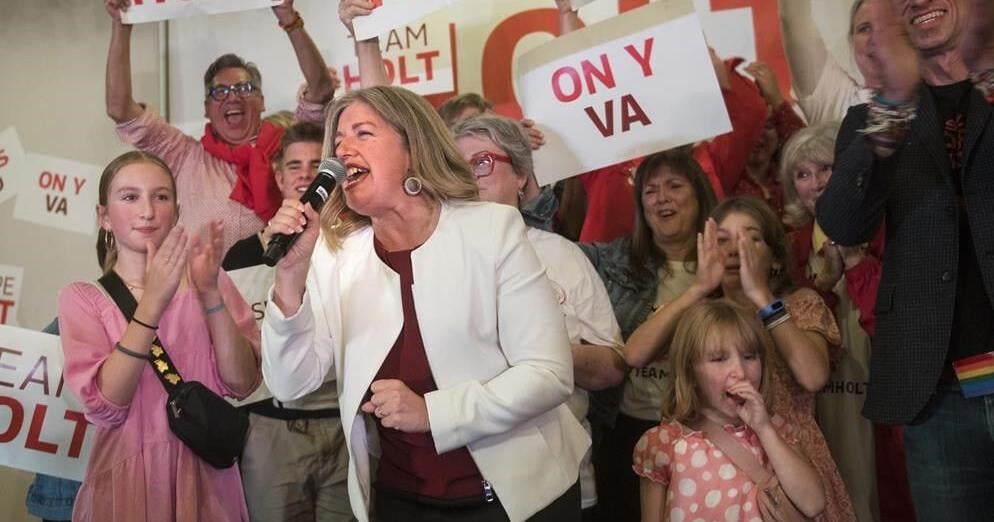FREDERICTON – After her party won a majority government in the New Brunswick election on Monday, Liberal Leader Susan Holt thanked all the women who came before her.
Flanked by her three young daughters on stage in Fredericton, Holt, the first female premier-designate in New Brunswick history, delivered a bilingual victory speech that paid tribute to female trailblazers in provincial politics.
The 47-year-old former business advocate and public servant led the Liberals to victory after a 33-day campaign, thwarting Blaine Higgs’s bid to secure a third term as Tory premier.
Aside from her tough-talking style, the 47-year-old party leader from Fredericton is known for her varied work history, which includes stints in the private and public sectors.
Her first job was scooping ice cream at a gas station in Fredericton before she was promoted to cashier at a nearby grocery store. She later worked for other local entrepreneurs, including an engineering firm and some IT startups. She went on to management roles within large IT firms, including IBM, Xerox, HP and Research In Motion.
Before entering the political arena, Holt served as CEO of the Fredericton Chamber of Commerce and CEO of the New Brunswick Business Council. A graduate of Queen’s University in Kingston, Ont., she has also worked as a business lobbyist and consultant.
After working as an adviser to former Liberal premier Brian Gallant, Holt won the provincial Liberal leadership in August 2022. She was elected to the legislature in an April 2023 byelection, representing a largely rural riding in northern New Brunswick. At the close of the latest campaign, she won a riding in Fredericton
Holt has repeatedly drawn attention to what she has described as Higgs’s top-down leadership style.
“We’ve seen that Blaine Higgs can’t work with anyone,” Holt said in a recent interview with The Canadian Press, noting that 14 of his caucus members have quit their posts since the Tories won a majority in 2020 — several of them openly complaining about how the premier ran the government.
“He’s a my-way-or-the-highway, one-man show,” Holt said. “And that’s not good for New Brunswickers.”
She said Higgs, a former Irving Oil executive, had shifted his party towards more conservative policies. She cited his decision last year to require teachers to ask parents before they use the preferred pronouns of transgender students under 16 and promised a Liberal government would change that policy.
Holt has pledged to implement changes recommended in a report released last year by Kelly Lamrock, the province’s child and youth advocate. Lamrock said children in Grade 6, who are around the age of 12, should be allowed to make the decision without parental consent.
As for the campaign, it was a lacklustre affair, perhaps most notable for the Progressive Conservative leader’s decision not to take part in any scheduled public events during at least 10 days of the race.
Still, it wasn’t an easy ride for Holt. Last week, she was on the defensive for comments she made about residents in her former riding in northern New Brunswick.
In January, Holt was describing the diversity of the province when she told a podcast that in Fredericton there were “really progressive people here, highly educated … and my riding of Bathurst East-Nepisiguit-Saint-Isidore has (a) totally different makeup.”
In response, the Progressive Conservatives released a campaign ad that accused the Liberal leader of suggesting Bathurst residents were not as smart as people in the capital.
Holt acknowledged she should have been more careful with her words. “It’s always a lesson that you have to speak carefully because there are people out there who will want to twist your words … for political gain,” she said in the interview.
The Liberals focused much of their campaign on improving the province’s health-care system. Holt said the topic dominated discussion at the doorstep.
“People are legitimately afraid to go to an ER because they might be waiting there for 12 hours,” she said. “Our health-care system is in crisis.”
The Liberals are pledging to build at least 30 community care clinics across the province over three years, bringing together doctors, nurses and other health professionals under one roof. Holt has said doctors are eager to work in such clinics because the administrative support can free them from paperwork and other time-consuming tasks.
Asked how she felt about the possibility of making history as the province’s first female premier, Holt said: “I thought we would get here before now.”
Then she turned attention to her daughters, ages 12, 10 and seven.
“It’s pretty surreal to think that I might show them that this particular glass ceiling can be broken and there won’t be barriers to what they can achieve in their lives,” she said.
This report by The Canadian Press was first published Oct. 21, 2024.
